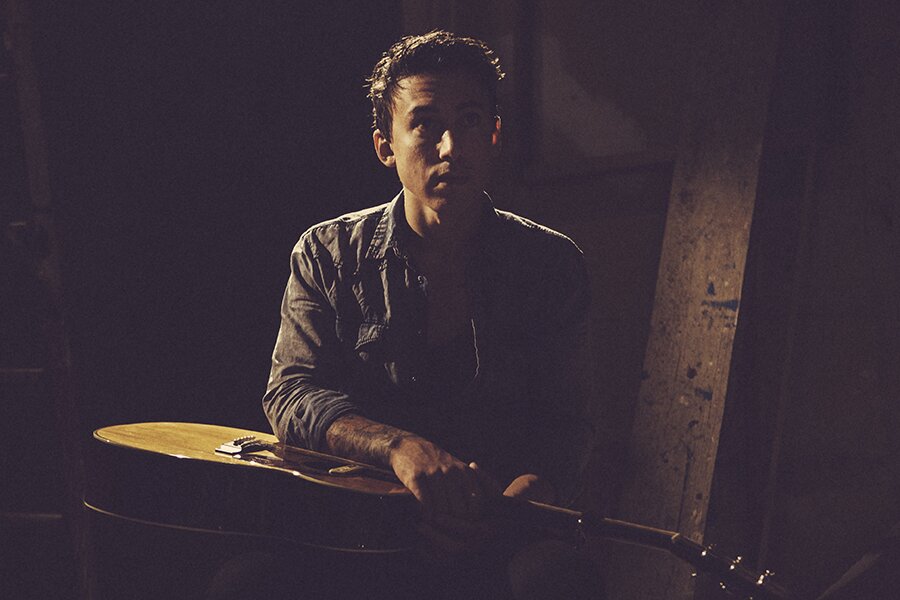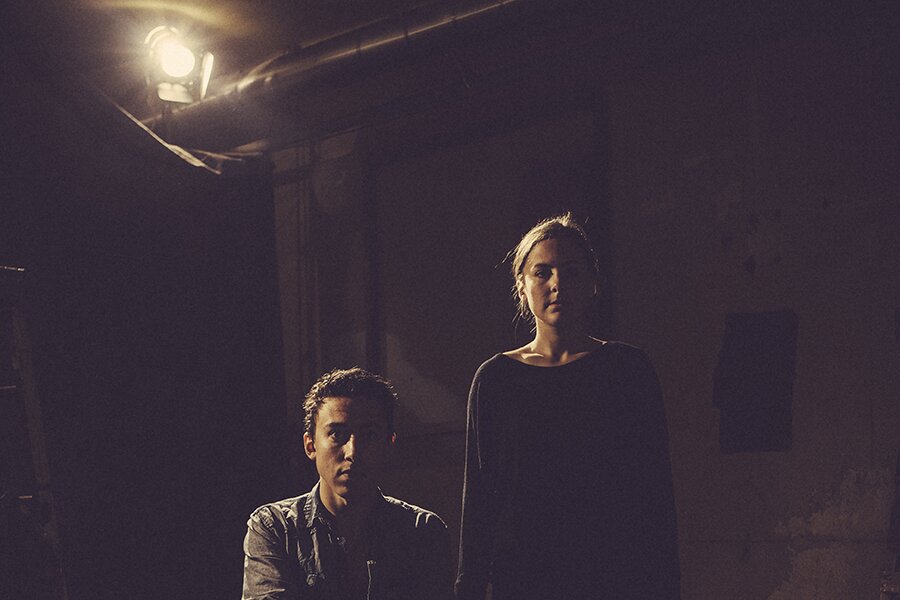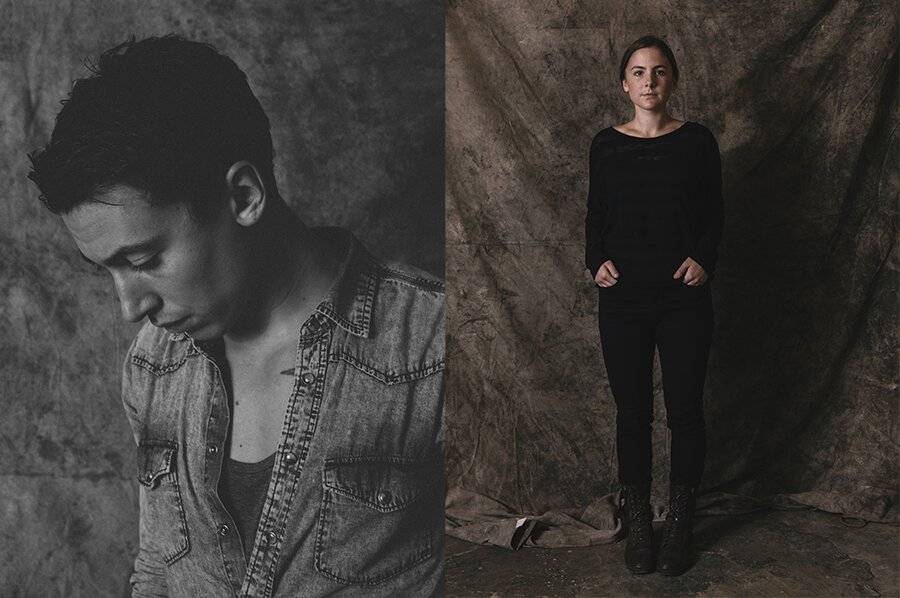"It takes a certain kind of musician to capture your attention so completely that the spaces between the notes, between the words, carry as much weight as any other part of the song. Noah is that kind of musician. Noah is that kind of writer. And it was our honor to be in the room as he and Abby created grand, sprawling, effortless spaces in the songs they tracked with us. I then sat down with Noah to talk about writing, the energy in a venue, and navigating the music business on your own..."
-Ryan Booth, Creator/Director
RB: Does it feel like writing music is something you’ve always had to do or is this something that you discovered along the way at some point?
NG: As a kid I fell in love with music because it was a friend, a place that I could go that had no rules or judgments. Writing allowed me to escape. I found that writing gave me the ability to convey emotions, thoughts, feelings, and questions that I wasn’t always necessarily able to convey in conversations. Music was a way for me to convey all those things. I’ve been writing since I was 13, so yeah, it’s all I’ve ever wanted to do.
RB: What do you mean by escape?
NG: Well, to be honest, I didn’t have a lot of friends so I just spent a lot of time in my bedroom writing songs. But then I found that people really liked my writing, I found something that I was good at, and I've stuck with it.
RB: Have your songs always been so personal? Has that always been the way that you’ve written?
NG: Yeah, they’ve always had a really personal element to them.
"I’m gonna say what I’m gonna say, and in that I’m not going to intentionally try to alienate or offend people or try to make myself look any better or worse than I am. Good or bad, I’m just musically sharing my diary"
RB: Does it feel like a paradox to create something that’s very personal even though it’s going to end up being presented very publicly?
NG: The funny thing is that it has never bothered me. I guess in some way, I have a level of self-confidence in my own thoughts and honestly, don't really care what people think about me. That is something that I’ve developed over the years. My attitude in life has always been that I’m gonna say what I’m gonna say, and in that I’m not going to intentionally try to alienate or offend people or try to make myself look any better or worse than I am. Good or bad, I’m just musically sharing my diary. Which is maybe a little weird, but hasn’t ever really bothered me for one reason or another.
RB: Not bothered you because you haven’t really thought about it or not bothered you because fundamentally it just doesn’t?
NG: I just don’t really worry that much about sharing these emotions. The funny thing is, I’m much more prone to share them in songs than I am in conversation.
RB: What do you think it is about songs or music in general that let’s you be comfortable doing that? That let’s you say the things that you wouldn’t in person?
NG: It’s safe. You have a bit of a shield to hide behind. I really respect people who do poetry because that’s an even braver expression because you don’t have any kind of melodic shield to hide behind or to help carry the burden.

RB: It seems that the way that you actually write the songs -- you and a guitar -- is actually how you often go out and play them live. Is there a division in your mind between moving from the writing to the performing? Is that two different sides of the same expression or do you feel like those are kind of two distinct, different experiences?
NG: When I’m in my room, physically writing a song, that’s the most personal level of the creation process. But when you take a song to an audience and you get to interact with the energy and the emotion of the people in the room, that process can take the song to an entirely new level. It's not yours anymore and that shared experience multiplies the energy and the emotions and the feelings expressed in the music.
RB: Do you find that that multiplying process reveal layers in your songs that you didn’t know were there when you were writing them?
NG: Absolutely. There are definitely moments in writing a song where its stream of consciousness of sorts. But then I may have moments where I’m performing a song that I’ll have an epiphany about something that I wrote that I wasn’t exactly sure what it meant at the time. It’s in those moments that I can be surprised by my own songs.
RB: Yeah, do you feel like that that is a pleasant surprise or is it a necessary component to saying a song is “done?”
NG: It makes me believe more in the spiritual power of music and that I can’t take credit for everything that I make. Realizing later some of the symbolism or analogies in a song that I may not have intentionally written is a reminder that there is some kind of muse that moves through me at times when I’m creating and that I don’t always even know what intention I may have when writing
"When you take a song to an audience and you get to interact with the energy and the emotion of the people in the room, that process can take the song to an entirely new level. It's not yours anymore and that shared experience multiplies the energy and the emotions and the feelings expressed in the music"
RB: Are you ever intentional when you sit down to write? Is there ever a “I’m going to write a song now” moment or is it more ephemeral, like you’ve been kicking something around in your head for days, weeks, months, and then suddenly it comes spilling out…
NG: It goes both ways. There are moments when I have a specific idea in mind that I want to convey. There are other times when I feel thoughts or emotions that are welling up inside of me, and I know they need to come out. I’ll try to spend as much time with a guitar or piano as possible in hopes that they’ll find their way out. (pause)
Sometimes writing feels very intentional, other times it is simply putting myself in the place where the muse can work, which means quieting my surroundings and focusing, being patient, and allowing the songs to come. Other times it is work, and it is intentional; really sitting down and processing thoughts in a creative way and then trying to convey them so that they’ll mean something to people.
RB: How has that process for you changed since the last time you sat down to write for a recording? Is that process something that’s shifted for you over time? Is it something you’ve gotten better at?
NG: Well I think the more you work at something, hopefully the better you get at it. The double edged sword of getting better at writing is that the more you work at something the more critical you become of your own art. Which can lead to a better product, but the process can be quite a bit more pain-staking.
RB: At what point in the process do you start to allow yourself to be self-critical? Is there a threshold you have to pass before you begin to reflect on what you’re making?
NG: I’m self-critical throughout the entire process. A lot of times it makes me quit before I’m even half way through a song. I may just say, “oh fuck it, this isn’t working.” Lately though, I’ve been trying to be more disciplined about coming back to songs and attempting to finish them, even if I don’t think it will ever be released. It’s that process of completion that is an important discipline to develop if I want to keep writing songs.

RB: A lot of my friends and I are starting to talk about just how noisy our everyday lives are…about how hard it is to make the time and space to be truly still. I mean, I can be infinitely distracted at any point, if only with the phone that’s in my back pocket. Any time I want, I can avoid having to just sit and be quiet. I flew home on an airplane yesterday and I remember distinctly getting on the plane thinking to myself, “you know what, I’m not going to do anything on this flight. I’m not going to work, I’m not going to watch a movie. I’m just going to sit and be quiet and think about things,” and dammit if ten minutes into the flight I didn’t reflexively pull out my phone and start reading something. Then halfway through the flight I realize that it’s all that I’ve been doing! Reading and playing stupid games. Do you feel like this baseline distraction is a struggle for you?
NG: Absolutely. That’s a massive struggle for artists in the 21st century. We have so many potential diversions from what is fundamentally a scary process; making art. Because there is so much potential for failure, you can let your self-doubt and your self-criticism lead you to distract yourself and look at your phone or check twitter or send emails. Sitting still and being patient and calming my mind and giving my thoughts time to ferment and form is a scary process because when you’re quiet, a lot of things come up that you didn’t realize were there.
Sitting still and being patient and calming my mind and giving my thoughts time to ferment and form is a scary process because when you’re quiet, a lot of things come up that you didn’t realize were there."
RB: Hm. Yeah, it’s terrifying, it’s totally necessary, and I’m really very bad at it.
NG: I agree completely (laughter)
RB: Do you co-write with other people ever or are your songs just your thing?
NG: I’m not very good at writing with other people. I have a tendency to take control of whatever situation I’m in and to some degree, that’s something I’d like to change in myself. I guess I’m interested in the idea of cooperation, but I fear that if I allow someone in, then it won’t purely be my thoughts and emotions that comes through in the songs.
RB: Meaning that you wouldn’t be able to perform it as truthfully, if you had to perform someone else’s words or story?
NG: Yeah, potentially, but really it’s just the fear is that it wouldn’t as wholly be mine. Any time you share the creative process, the thing you make isn’t yours anymore, its shared. Because my songs are so personal, it’s a particularly difficult thing to think about letting go of. Sure, when you play a song for an audience the feelings and the emotions conveyed in the song become a communal experience, but not the core structure of the song.
RB: I mean that’s a paradox that’s tough about making things, cause once other people take ownership of it, especially because of how personal a thing it is for people, you don’t ever really get it back. And it can end up meaning all kinds of things that you never really originally intended.
NG: Yeah, but I like that. I don’t feel like I’m so precious about my own songs that I’m afraid of them being misinterpreted or misconstrued. I create them for myself and then I share them with other people and then whatever meaning they take from them, that’s out of my control. So I can’t really worry about that too much.




















